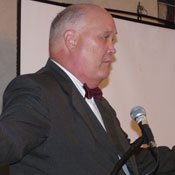Mississippi must address its budget problems at both ends of the state's cash flow by raising taxes and cutting spending, Stennis Institute of Government Executive Director Marty Wiseman said today at the Mississippi Economic Policy Center's annual conference.
"We are hearing some legislators start to put the revenue increase issue on the table," Wiseman said. "No policymaker wants to be accused of raising taxes, but it has to take place."
Rep. George Flaggs, D-Vicksburg, has raised the possibility of an increase in the state's tax on casino revenues, which are among the lowest in the country, Wiseman said adding that State legislators often defend their opposition to raising taxes by saying that they haven't heard any support for higher taxes from constituents.
"They need to start hearing it," Wiseman said.
Wiseman echoed statements by other speakers at the conference, including John Shure, deputy director of the State Fiscal Project at the national Center for Budget & Policy Priorities, a nonpartisan think tank.
State and local governments across the nation have cut 400,000 jobs, but the national economy is still recovering slowly, because of unemployment and sluggish consumer spending. Between February 2008 and August 2010, Mississippi lost 78,000 jobs, bringing employment to the same level as 1996, state economist Darrin Webb said.
"Just as people's needs have been increasing, the state's ability to meet those needs has been shrinking," Shure said. "Actually, it's collapsed."
Shure said that the severity and length of the national economic recession makes a cuts-only approach to recovery unfeasible. If states cut programs without also increasing revenue, they will leave themselves unable to take advantage of the economy's eventual rebound.
"People say you can't spend your way out of a recession," Shure said. "Well, you also can't cut your way out. We're way past the point of either/or choices."
Shure called tax increases "a responsible of part of a balanced approach" to states' budget woes. Already, more than 30 states have raised taxes to deal with the recession. In past recessions, states that have raised taxes have performed no worse once the economy recovered, than those that did not raise them, Shure said.
"It's a myth that raising taxes jeopardizes state progress," Shure said.
All speakers emphasized the importance of investing in the state's education and workforce development systems to ensure economic progress in the future. Wiseman said that funding for early childhood education is finally gaining broader political support, despite the state's revenue problems.
Wiseman said that waiting till a child is six years old for education is too late because 80 percent of their brain is already developed.
"How many generations do we need to lose before we say, ‘Now we can afford this'?" Wiseman asked.



Comments
Use the comment form below to begin a discussion about this content.
comments powered by Disqus